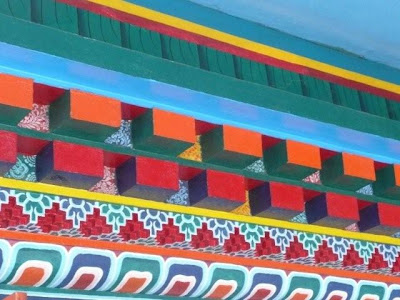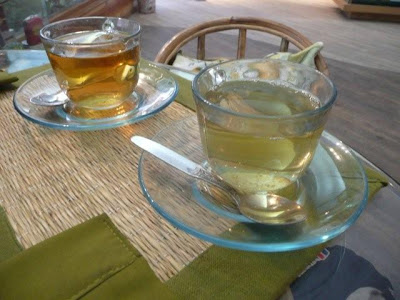Breakfast is tea and eggs. A large pot. Not included in the room rate, but a large pot, two sets of two eggs and plenty of toast comes to 140 rupees, or about one pound sixty, so no big issue. We talk to Fenula, a Canadian who suggests going to the Dali Monastry, or Druk Sangak Choling Gompa, later, so we agree to meet. After eating, we head out. First stop, just round the corner, the marvellous Oxford Book Store, where I could spend a lot of money if I had porters carrying my backpack.

Oxford Book Store

Old men under Pop Idol poster
Then we walk along to Observatory Hill, which is sacred to both Buddhists and Hindus, as it was home to the original Dorje Ling gompa that gave the town its name.

Longyi’ed up for the occasion
It’s a pretty site with hundreds of prayer flags draped all over the site, but I resent taking my shoes off for such a filthy spot!

How to go deaf quickly. Stand near these




After we walk back to the hotel, passing some English-style houses.

We meet Fenula again, and we walk down to the shared jeep area to catch a ride along to the monastery.
Shared jeeps are the main form of transport in the mountains here, and they are surprisingly reasonable. Our ride, for about 20 minutes (though not that far), cost 6 rupees per person. To Siliguri, a 3 ½ hour ride, it’s 70 or 80 rupees (one pound).

They do cram people in though, and we laugh as the person we thought was the driver turned out to be a passenger sitting in the driver’s seat, the actual driver squashed against the door on his side, literally leaning across to steer.

Apparently in Sikkim they don’t allow this, but here anything goes. They use jeeps as the roads out in the hills are of variable standard. In the worst areas, they use old land rovers, and carry spares to effectively replace the whole vehicle if required!
I must say I’ve been impressed with the traffic police. They always seem friendly and helpful. Locals have told me this is only to tourists, but at least someone gets treated well (compare with the Indian army, or worse, civil service, who are generally snooty with everyone). At all major junctions there’s a booth with a couple of police men. Perhaps they’re helpful because most of them are Tibetan or Nepali? Am starting to develop prejudices here!
So the monastery is not far out of town, and I recognise it as one we passed on the train. At the entrance is a steep driveway lined with large murals.

Walking up here, one then passes classrooms which are full of young monks being taught. They laugh and smile as they see us peer in. We climb further, passing a room with large decorated prayer wheels and some elder monks who don’t look so happy to see us. Then at the top, where the main prayer hall is, and an open area.

This monastery is known for its beautiful frescoes, and houses 300 monks from all over the Himalayas studying philosophy, art, Buddhist literature, astronomy, meditation, sacred dance and music.



It was inaugurated by the Dalai Lama in 1993. Today there seems to be something going on – we learn that some sort of commercial is being filmed using the young monks, all in their robes. They’re clearly quite enjoying the job – standing in front of the main hall and holding up their hands as if to pray.



The clouds roll in
A monk from Ladakh shows us the main hall, and we see the extensive library, before leaving Fenula to stay and meditate whilst we visit the nearby Ava art gallery, which turns out to be a disappointment.


The contents are the works of a local artist who died a few years ago – mostly embroidery. Entry fee is 1 rupee, but as we only have a 1r coin or 10r note, they just charge us for one, which makes me feel rather bad given the charge!


Politics fading away
We try walking back to town, but it’s just too busy a road – one of the frustrations of the main roads in Darjeeling is that the jeeps hurtle along the roads, using their horn almost continuously. Some are reasonable volumes, but some are offensively loud and piercing. If you can’t beat ‘em..

We hop in a one for 5r each, and end up in downtime, where we go to Nathmulls, the best-known tea shop. There are two outlets, we visit the one in “Inox”, a completely out-of-place new glassy shopping centre in central Darjeeling. One literally double-takes rounding the corner next to the old stone post office as the mall comes into view.

Post office

Only in Darjeeling..

Nathmulls
Nathmulls stocks a variety of teas from the local area.

Their main business is export – taking chests of tea, packaging it up and sending off to Calcutta and beyond. In the shop they have a counter with dozens of labelled flasks of tea which they open and let you smell. They talk you through the tea cycle, then sit you down and brew up a few cups for you to try.

Friendly
This stolen from LP: The tea bush was first brought to Darjeeling from Assam by British planters looking to break China’s monopoly over the tea trade. Credit for the discovery of tea as it’s drunk today should go to the Khamti and Singpho tribes of Assam, who first introduced British explorers to the healing powers of fermented tea leaves brewed in hot water. And the rest, as they say…

Darjeeling apparently produces 25% of India’s tea (most of the rest from Assam). The process is thus: The picking is done in three waves, called “flushes”. So first flush, second flush, third flush. After picking, the leaves are placed on a withering trough and allowed to dry. They’re then crushed to squeeze the remaining water out. The leaves are then fermented in a humid chamber – this is the key process to determine the end flavour. The fermentation is stopped by passing the leaves through a drying chamber. Then the leaves are graded.

Tea Grades (best to worst):
Golden Flowery Orange Pekoe
Golden Broken Orange Pekoe
Orange Fannings and Dust
The first flush teas generally have the best aroma but less smell. The finest are “tippy”, i.e. just the very tips of the tea leaf bud, or “silver tips”, i.e. the youngest tips. Certain estates seem to command a price premium – Castleton Estate has produced teas going for 18,000 rupees per kilo. That’s 225 pounds sterling. For one kilo of tea! Really deserves the title of the champagne of tea!

The first flush tea we try is lovely – good taste and fantastic aroma, but I end up buying some different teas, all first flush. I’ve no intention of carting them around though, so we go round to the post office, who specialise in posting tea. The chap who wraps parcels is not about, so we’ll have to come back another time.
For lunch we eat at a simple Tibetan place across the road. The power is out, so it’s almost dark in the restaurant. Thuzar tries momos for the first time, and how can anyone not like fried momos (similar to gyoza for those familiar with Japanese food! The secret with momos is the chilli sauce. Best to snap the momo in half and fill both halves with copious quantities of the stuff, or dip away if it’s my favourite green chilli ketchup! I wash this down with Mazaa, a local mango drink which is rather good.

Momos in the dark
After we walk back up to the hotel, past the colonial Planter’s Club.

We head up on the roof with some beers, and shortly Darcy joins us.


For dinner, an hour or two after lunch (!), we wander down to Glenarys, one of the most popular foreigner joints in town (it’s the Busy Bee of Pokhara) with Darcy. Fenula is there already, having eaten, as are the Swiss couple from the train, who join us for a drink. It becomes very clear very fast to me that there are some very strong and opposing viewpoints and characters around the table, and I brace myself to duck under the table as the inevitable fight breaks out. Things calm down though when the Swiss leave, and Fenula succumbs to some drags on Darcy’s cigarette!

Break it up you lot

Dinner is good, and as is tradition in India, we over-order and of course try to finish the delicious curries with rice and naan. We walk home together in the dark at 9:30pm, and the place has become an absolute ghost town. Not a soul on the street, and the hotel door had been pushed to (though not locked). It’s as if a curfew is being imposed. Funny thing is, they don’t seem to get up especially early either – in places like Nepal or Vietnam where they sleep early it’s because they’re all up at 5am. Not here!




No comments:
Post a Comment